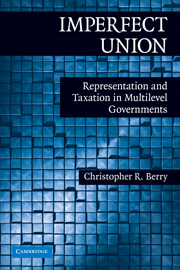Book contents
- Frontmatter
- Contents
- Preface
- Acknowledgments
- 1 Introduction: American Politics in 3D
- 2 What's Special about Special-Purpose Governments?
- 3 A Political Theory of Special-Purpose Government
- 4 Piling On: The Problem of Concurrent Taxation
- 5 Specialization and Quality
- 6 Governing the Fiscal Commons
- 7 Conclusion
- Methodological Appendix
- References
- Index
- Title in the series
5 - Specialization and Quality
Published online by Cambridge University Press: 05 June 2012
- Frontmatter
- Contents
- Preface
- Acknowledgments
- 1 Introduction: American Politics in 3D
- 2 What's Special about Special-Purpose Governments?
- 3 A Political Theory of Special-Purpose Government
- 4 Piling On: The Problem of Concurrent Taxation
- 5 Specialization and Quality
- 6 Governing the Fiscal Commons
- 7 Conclusion
- Methodological Appendix
- References
- Index
- Title in the series
Summary
The common-pool model of local politics put forth in this book is based on the idea that special interest groups have disproportionate influence in special-purpose jurisdictions compared to general-purpose governments. The result is that special-purpose jurisdictions spend more on their particular services than a general-purpose government would spend when performing the same functions. In the aggregate, this leads to the prediction that the total size of the local budget will be larger when a given bundle of services is provided by many single-function governments than when it is provided by one general-purpose government. The empirical results in the preceding chapter support this prediction, providing strong evidence that taxes and spending are higher in counties where there are more special-function jurisdictions for each municipality, all else equal.
The fiscal common-pool model, as developed in Chapter 3, does not make specific predictions about how special-function jurisdictions will spend their budgets. I merely postulate that there is an interest group that cares strongly about the service provided by each jurisdiction and prefers more spending on that service than other voters do. In considering the social desirability of special-function jurisdictions, however, an important question is whether they spend their additional revenue on providing higher-quality services or whether their inflated budgets simply reflect waste and inefficiency. Ultimately, the answer to this question hinges on the demands of the relevant interest groups.
Information
- Type
- Chapter
- Information
- Imperfect UnionRepresentation and Taxation in Multilevel Governments, pp. 129 - 147Publisher: Cambridge University PressPrint publication year: 2009
